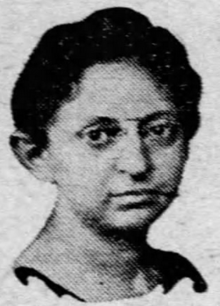Rosalie Loew Whitney
Rosalie Loew Whitney (May 4, 1873 – September 3, 1939) was an American lawyer and suffragist.
Rosalie Loew Whitney | |
|---|---|
 Rosalie Loew Whitney, from a 1924 newspaper. | |
| Born | May 4, 1873 New York City |
| Died | September 3, 1939 New York City |
| Nationality | American |
| Occupation | Lawyer, judge, government official, suffragist |
| Years active | 1890s – 1930s |
| Spouse(s) | Travis Harvard Whitney |
| Relatives | Leopold Löw (grandfather) |
Early life
Rosalie Loew was born in New York City,[1] the daughter of Hungarian Jewish immigrants William Noah Loew and Leontine (Lottie) Wechsler Lowe. Her father was a lawyer; her mother was a milliner.[2][3] Her paternal grandfather, Leopold Löw, was a noted rabbi and Jewish leader in Hungary.[4]
Loew earned a bachelor's degree in 1892 at Hunter College, and a law degree in 1895 from New York University School of Law.[5]
Career
Loew was admitted to the New York Bar in 1895. In 1896, she was the first woman lawyer to try a case before the New York Supreme Court.[5][6] She and her father were partners in a law firm, Loew and Loew,[7] before she took a position with the Legal Aid Society in 1897.[3][8] "It is an error to suppose that woman cannot look at things in a large way," she commented in an 1896 newspaper profile. "There is nothing in the mental bias of a woman to prevent her having a comprehensive knowledge of any of the affairs of life, no matter how great."[7] She used her language skills (fluency in Hungarian, Yiddish, and German) to represent and interpret for immigrant workers, in cases involving labor violations, predatory loans, and fraud.[6] In 1903, she was rejected for membership in the Bar Association of the City of New York, on the basis of her gender.[5]
Whitney was active in the women's suffrage movement in New York City,[1] as a member of the Brooklyn Woman’s Suffrage Party and as New York congressional chair of the Woman’s Federal Equality Association. She represented Brooklyn at the National Suffrage Convention in Washington in 1917; and she spoke on behalf of the National American Woman Suffrage Association in a Congressional hearing in 1918. She helped to found the National Women's Republican Club.[2][9] She attended the Republican National Committee meeting in St. Louis in 1918, working for the party's public support for the 19th Amendment.[6]
Whitney and her husband were partners in a law firm, Loew and Whitney, from 1903 to 1907. She served on the board of the Women's Municipal League. From 1919 to 1921, she sat on the New York State Industrial Commission, filling the vacancy left when Frances Perkins went to Washington.[10] In 1930 she was elected director of the Brooklyn Neighborhood Laundry Owners Association.[11] She was in the first group of twelve women admitted to the Bar Association of the City of New York, in 1937;[9] by that time, she had a long career in the law, and had already served two years as justice on the Court of Domestic Relations in New York.[2][6]
Personal life
Rosalie Loew married fellow lawyer Travis Harvard Whitney in 1903. They had three sons, Travis,[12] John, and William,[1] all born in the first five years of their marriage. Travis Whitney died in 1934; Rosalie Loew Whitney died five years later, in 1939, aged 66, from leukemia.[10] Her grave is in Green-Wood Cemetery in Brooklyn.[2]
References
- The New York Red Book. Williams Press. 1922. p. 214.
- Thomas, Dorothy. "Rosalie Loew Whitney". Jewish Women's Archive. Retrieved 2020-05-29.
- Felice Batlan, "The 'Rabbi's Daughter' and the 'Jewish Jane Addams': Jewish Women, Legal Aid, and the Fluidity of Identity, 1890-1930" 4 Indiana Journal of Law & Social Equality 135 (2016): 139-143.
- Loew, William Noah (1912). Leopold Loew: A Biography: with a Translation of Some of the Tributes Paid to His Memory on the Occasion of the Centenary of His Birth, Celebrated at Szeged, Hungary, June 4, 1911. the Author. p. 36.
- "Rosalie Loew Whitney". Women's Legal History. Retrieved 2020-05-29.
- Dutton, Sarah. "Biographical Sketch of Rosalie Loew Whitney". Biographical Database of NAWSA Suffragists, 1890–1920, Alexander Street Documents. Retrieved 2020-05-29.
- "Woman and Home; A Young Woman Who is her Father's Law Partner". The Monmouth Inquirer. 1896-04-30. p. 6. Retrieved 2020-05-30 – via Newspapers.com.
- Gunby, Olive F. (1898-04-24). "Free Law; Miss Rosalie Loew Asks Nothing From Poor People". The Los Angeles Times. p. 44. Retrieved 2020-05-30 – via Newspapers.com.
- "Mrs. Rosalie Loew Whitney, Domestic Relations Court Jurist". The Brooklyn Daily Eagle. 1939-09-04. p. 9. Retrieved 2020-05-30 – via Newspapers.com.
- "ROSALIE WHITNEY, JURIST, DIES AT 66; One of First Women Members of New York Bar Won Fame as Foe of 'Loan Sharks' HALTED LAUNDRY 'RACKET' Became 'Dictator'--Named by La Guardia Justice of the Domestic Relations Bench". The New York Times. 1939-09-04. ISSN 0362-4331. Retrieved 2020-05-30.
- "Laundry Men Clean House; Woman Czar". The Brooklyn Daily Eagle. 1930-05-05. p. 2. Retrieved 2020-05-30 – via Newspapers.com.
- "Policeman Goes on Carpet for Arresting Portia". Daily News. 1924-07-26. p. 32. Retrieved 2020-05-30 – via Newspapers.com.
External links
- Rosalie Loew Whitney at Find a Grave
- Rosalie Loew Whitney letter to Anna M. Jackson (January 8, 1908), in the Branson-Jackson Family Papers, Friends Historical Library of Swarthmore College.